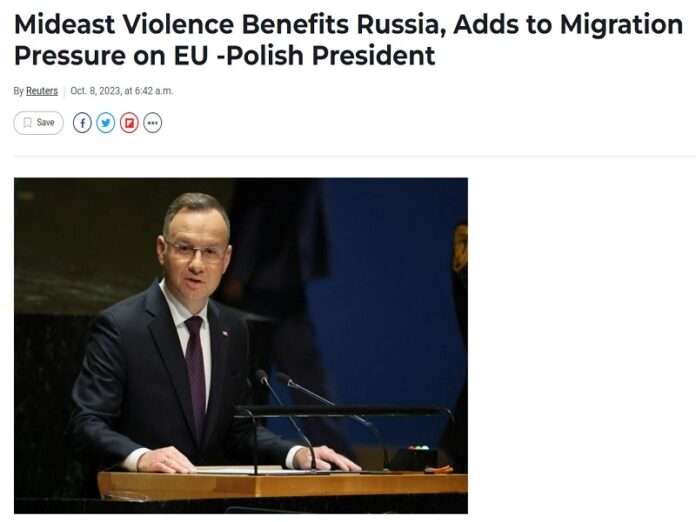Polish President Duda claimed over the weekend that the latest Israeli-Hamas war “benefits Russia” because “It distracts the world’s attention” from Ukraine, but this is misleading for several reasons. First, it extends false credence to those conspiracy theories speculating that Moscow played a role in these attacks, which don’t stand up to scrutiny since it’s unimaginable that Israel wouldn’t have called it out. These lies are being peddled by those who fear that the West will prioritize aid to Israel over Ukraine.
The preceding expectation segues into the second critique of Duda’s claim since there’s arguably a more urgent need for the West to support its decades-long traditional Israeli ally over its newfound non-traditional Ukrainian partner nowadays. Kiev’s counteroffensive failed to significantly shift the Line of Contact (LOC) that’s largely remained the same for nearly a year already while Tel Aviv’s has just begun. It therefore makes sense for the West to send finite military aid to Israel instead of Ukraine right now.
The third point to make is that this zero-sum choice is the direct result of Western countries irresponsibly emptying their stockpiles over the past nearly 20 months arming Ukraine at the expense of keeping supplies in reserve for contingency scenarios like the one that just emerged with Israel. It could have therefore been entirely avoided had the West moderated its arms shipments to Ukraine and encouraged their proxy to re-enter into peace talks with Russia after having sabotaged this process in spring 2022.
Fourth, there’s no objectively existing dilemma over which conflict the media should pay more attention to since this is the voluntary choice of the West’s leading outlets. In their competition with one another for ratings, they rightly predicted that they’d lose readers/viewers if they gave equal coverage to both conflicts or continued favoring the Ukrainian one. Duda should therefore focus his anger on those companies instead of Russia since the latter has nothing to do with their editorial decisions.
And finally, the Polish President assumes that Russian interests aren’t adversely affected by instability in West Asia, though this isn’t true since the Kremlin fears that the latest Israeli-Hamas war might expand throughout the region. In the event that it spreads to Syria, Russia’s anti-terrorist successes over the past eight years risk being reversed if Israel initiates a large-scale bombing campaign against the IRGC and Hezbollah, which could create space for ISIS’ and other terrorist groups’ revival.
Altogether, while it’s easy to see why some think that the latest Israeli-Hamas war benefits Russia, this assessment is misleading since it’s purely based on specious talking points. The West’s zero-sum dilemma over whether to prioritize military aid to Israel or Ukraine is due to its own irresponsible policies while the media’s focus on the most recent conflict is its editors’ voluntary choice. Russia has nothing to do with either and its regional interests are threatened if the war expands into Syria.







